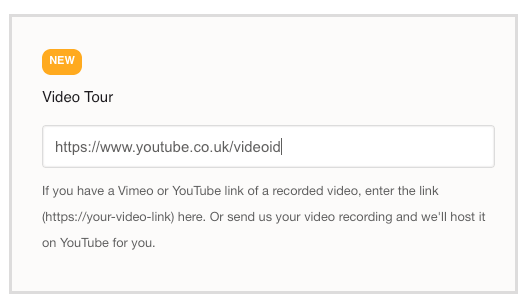With ‘in-person’ viewings posing a COVID-19 risk, many landlords are now relying on the power of photography and virtual viewings to seal the deal with potential tenants.
Back in March 2020, the initial shock of the COVID-19 certainly caused some disruption in the rental market: tenant demand fell by 57%, and the number of new properties becoming available dropped significantly (Zoopla).
Nonetheless, despite this dramatic decline, activity in the property sector has continued, and tenant enquiries are coming in.
With digital agreements and video call technology, landlords are still able to successfully let their properties while safely following the government’s rules on social distancing.
We understand that virtual tours and viewings may be new territory for even the most experienced of landlords – but hopefully, this article will help you to get started.
How are landlords feeling about virtual tours?
We reached out to a few of our landlords who are currently advertising with us to find out how they felt about conducting virtual viewings. Here’s what they thought:
- Some said they want to be able to advertise their property with a 3D virtual or video tour
- Some landlords say they are happy to “meet” a tenant via video call (perhaps on Whatsapp, Facetime or Zoom) and would be comfortable with letting to a tenant they haven’t physically met in person
- Some landlords were worried that a video may not accurately describe the property and could cause issues with tenants further down the line.
So, do you share any of these thoughts or concerns?
From what our landlords have told us, it appears that most are firmly on board with the idea of carrying out viewings online, but for some, it’s not the appeal of online viewings that has them worried – it’s how to actually do it.
Up next: Property Management Companies & How To Choose One In 2021
Organising a 3D virtual property tour
If technology isn’t your strong point, the idea of filming a decent video of your entire property and putting it somewhere on the internet can certainly be an overwhelming prospect.
Thankfully, there are professionals that will take care of it for you. We can organise a 3D virtual walkthrough tour to be filmed, edited and uploaded to your property advert.
Also called a “360° view”, virtual tours allow tenants to ‘visit’ your property directly from their desktop or phone.
Prospective tenants will be able to view your property from anywhere, at any time, all whilst keeping safe.
Not sure what a 3D virtual tour looks like? Take a look at this example.
Join our rental plans (starting from £39 inc VAT) and get a free 3D virtual tour when you purchase professional photography.
How does a 3D virtual tour work?
Taking a look at the example video, you’re probably wondering how on Earth 3D virtual tours are made.
Your virtual tour is basically made up of many different panoramic images. Your professional videographer takes four specialised photos of each room at a 90° angle and blends them together to achieve the 360° view.
Each room is connected through clickable linked arrows – allowing potential tenants to ‘walk’ from one room and into the next.
Your virtual tour will have it’s own website URL for you to upload directly to your property advert and share wherever you like.
Get a FREE 3D virtual tour when you join our rental plan and purchase property photography throughout January.
A landlord’s easy step-by-step guide to filming
Javi, a landlord currently advertising with LettingaProperty.com, tells us how he put together his own online video viewing simply by using his smartphone and the power of the internet.
Filming
To film my video, I used my iPhone 8 to record short, simple videos of each room of the property. I made sure each video was smooth and clear and used my phone’s Wide Angle Lens to give my video a professional look (this part isn’t essential, but most modern smartphone cameras have this feature).
Editing
I chose to film several videos and put them together, although some people may find it easier to simply film their entire property in one take.
I stitched my videos together using the iMovie app on my iPhone (Similar free apps such as FilmoraGo or Vid Trim are available for Android users). This allowed me to easily insert my short videos, put them in order and trim them down if needed. You can even add some background music if you really want to. Then, I exported the video in the highest resolution possible and saved it to my Camera Roll.
Uploading
To allow people to watch my video, I uploaded it to YouTube. All you have to do is make a free account – or ‘channel’ – and follow the steps to uploading a video, such as adding a title and description. If you haven’t already, you can edit your video directly via YouTube and add an audio track if you want to.
At this point, YouTube will have to process your video – which can take a long time (4-6 hours). Once it’s processed, you will be able to share the video using the website like (URL) generated by YouTube.
Advertising
Once my video was fully uploaded to YouTube, I then added it to my property listing on LettingaProperty.com by adding the link to the Video Tour section on my advert (image below).

Rightmove have also enabled videos to be included in property listing on their website. Find out more here.
Let Agreed!
After uploading the recording to his advert, Javi’s video received over 190 views online within a few days, leading to a successful application to rent.
Video Viewings: Top Tips to Remember
So, there you have it. A simple explanation, from one landlord to another. Here are a few extra things to bear in mind when making your video:
- Slow and steady wins the race – keep your camera/device steady and take your time to show every room in the property.
- Don’t leave anything to the imagination – Your video should include everything that a visiting tenant would usually see (even boilers cupboards, storage spaces, driveways and garages).
- Short and sweet – while you should include everything you can, it doesn’t need to be a full-length feature. Ideally, your video should be a maximum of 2-3 minutes long.
- The good, the bad and the ugly – Don’t shy away from showing parts of the property that need fixing up. It’s better to be completely transparent than to advertise your property as something that it’s not.
How I Successfully Let My Property During COVID-19
It’s completely understandable why some landlords would be put off advertising their rental while the country is on lockdown. But the truth is, while the rental market is certainly a little different to what it was this time last year, there are still people looking to let.
While the entire situation is challenging for everybody, it seems that the past year has given people time to adjust to change and come to terms with their new reality.
As a result, the dip in rental interest that we saw last year is beginning to turn around, with Zoopla reporting that tenant demand has increased by 30% since March’s 57% decline. I’ve experienced this increase in interest first-hand with my own rental property.
I advertised my two-bed apartment in Worcestershire on the 1st of April 2020 and received my first enquiry in a matter of hours and had 15 potential tenants contact me over the following days.
I sent each person a video tour I had recorded on my phone and answered any follow-up questions via Whatsapp.
After just one week, three long messages and a telephone conversation, my final applicants asked to go ahead with the next steps. We started reference checks, they paid their holding deposit, and moved in on 1st June 2020.
The Legal Implications of Virtual Tours and Video Viewings
You may wonder, what are the legal implications of a tenant agreeing to let a property without actually seeing it in person?
Property law specialist David Smith of JMW Solicitors has provided us with some valuable clarification:
There is no reason why an agreement would not still be valid merely because of the lack of a physical inspection. Certainly, a video-only tour would increase the risk of a tenant claiming that something was hidden and then using their rights under the CPRs (The Consumer Protection from Unfair Trading Regulations 2008) to unwind the agreement. However, this is like any claim for unwinding and would be fact-specific in terms of looking at whether the item was hidden and was material.
David Smith, Partner at JMW Solicitors
In these circumstances, anyone interested in your property is relying solely on the photographs, description and videos that you provide.
If you don’t share any problems or issues that your property has, potential applicants will be unable to make an accurate and informed decision on whether they’d like to rent your home.
More poignantly, failing to reveal your property’s flaws or purposely covering up defects in your video will be a breach of the Property Misdescription Act.
If you choose to carry out a video viewing, you should make every effort to give a true representation of your rental and take the time to show every part of the property.
Ready to advertise?
So, if you were debating whether to give the whole video thing a go, hopefully, this article has given you the confidence you need to get started.
If you have a question about video viewings or want to find out more about advertising, feel free to get in touch with our team.
Book professional photography when you join our rental plans and receive a free 3D virtual tour (usually £99).



